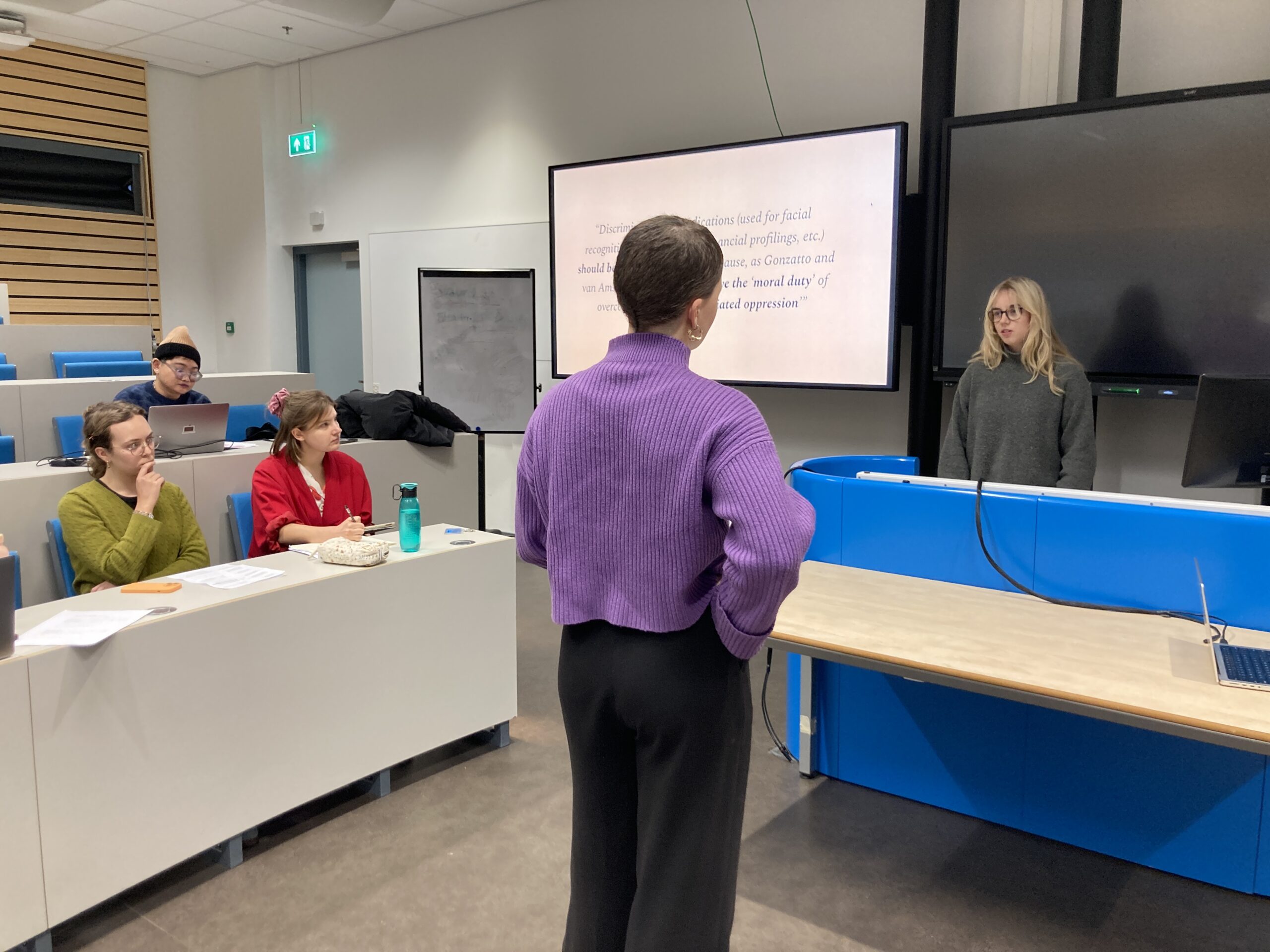Acting as prosecutors and defenders, Industrial Design Engineering students faced off in the ‘courtroom’ this January. The case in question: the role of AI in design education. Lecturer Fernando Secomandi saw how his mock trial method forced students to think deeply. “This could work in other faculties too.”
First session of a mock trial as a new educational form at IDE (Photo: IDE)
Prosecutors, defenders, witnesses, a jury, and a chairperson – about 20 students took on roles in a large lecture hall transformed into a courtroom at the Faculty of Industrial Design Engineering (IDE). They held fictional trials about the impact of generative artificial intelligence (AI) on design education and the professional practice of industrial designers. The two trial sessions were part of the master’s Design Justice and Emerging Technologies elective, taught by Fernando Secomandi.
Secomandi got the idea for the mock trial after collaborating with the Erasmus School of Law during the Connecting Law, Design & Tech event last year. The gathering, organised by the Dutch Legal Design Lab (in which IDE is also involved), featured a simulated trial on visual contracts – real-world cases where legally binding documents are made more user-friendly through design. Secomandi thought that a simulated trial could also work at TU Delft.
Mock Trial
So he and colleagues from TU Delft’s Design for Values Institute wrote a white paper on design for justice, advocating tackling inequality through design. Inequality in this context includes technological innovations that negatively impact certain groups, such as wind turbines obstructing scenic views or lithium mining displacing natural habitats.
The core question of the IDE mock trial method became: How should scientists and engineers handle the societal consequences of technological innovation? The advantage of this approach? “Teams must listen carefully to each other to understand the opposing viewpoint and identify the strengths and weaknesses in their arguments. They need to put themselves in their opponent’s shoes to grasp their rationale,” says Secomandi.
Opening Statement
The students took their task seriously. In their opening statement, the prosecution argued that generative AI, such as ChatGPT, should be banned from the Faculty’s curriculum. Not only is the technology unsustainable due to its high energy consumption, but it also tends to generate the most popular rather than the most original solutions. “Using AI undermines intellectual discipline and craftsmanship – essential qualities in design,” argued the prosecution.
Students were extra motivated to come up with strong rebuttals
The defence disagreed. “Banning AI from the IDE curriculum won’t make AI disappear. Only by engaging with it can students steer AI in a more sustainable and innovative direction. Ignoring AI will only accelerate the future we are trying to prevent,” they countered.
Following the opening statements, both prosecution and defence questioned witnesses while a jury observed. Each session lasted between 70 and 90 minutes. There was no judge, so the students had to reach a final verdict themselves as part of their course assessment. Secomandi coached the students in their preparations and graded their work, but mainly acted as a timekeeper during the sessions.
A Tribunal for Technology
Afterwards, Secomandi received enthusiastic feedback from his students. They felt they had learned more than they would have in a traditional exam. The reason why isn’t entirely clear, though the lecturer has a theory. “I think it helped that they really had to engage with counter arguments. That gave them a more complete understanding of the topic. And because the mock trial was a kind of competition, students were extra motivated to come up with strong rebuttals. They didn’t want to lose.”
Student Reactions:
- “I felt really engaged with my team during the mock trial.” – Maja Riemann
- “Compared to presentations and reports, the mock trial was not only better for research but also for remembering information as we had to defend our claims.” – Harshita Sethi
- “For many courses, we read some material, understand it, and write a report. But in this case, we had to find research that contradicted our beliefs and argue from different perspectives.” – Nanditha Sathyanarayanan
Secomandi believes that lecturers in other faculties could also use the mock trial method to discuss the ethical aspects of technology. He has submitted a proposal to an open education fund to further develop the mock trial as a teaching model for ethical dilemmas in technology and engineering courses.
Low Workload for Lecturers
And that’s not all. Secomandi also sees potential for a Studium Generale-style setting – public sessions where societal and scientific interests clash. In this way, technical universities could become tribunals for technological issues affecting society.
Another advantage of the mock trial is that the workload for lecturers is relatively low. “With clear instructions and templates, students can work largely independently. And they can choose their own topic, which increases their involvement. This time it was about AI in design education, but next time it could be about the role of social media.”
- More about the Design Justice and Emerging Technologies course
- More about the Design for Values Institute
Do you have a question or comment about this article?
j.w.wassink@tudelft.nl


Comments are closed.